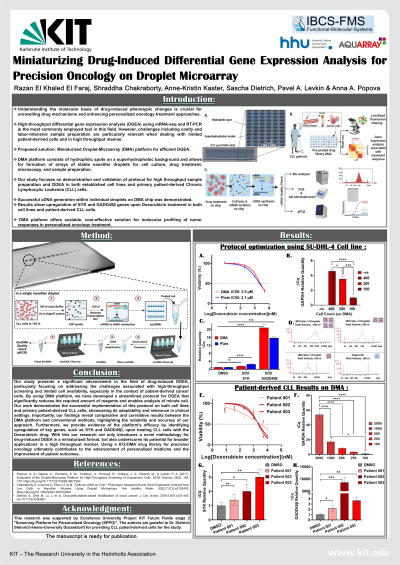Screening Applications & Diagnostics
Poster Session A
(1046-A) Miniaturizing Drug-Induced Differential Gene Expression Analysis for Precision Oncology on Droplet Microarray
Tuesday, May 28, 2024
16:30 - 17:15 CEST
Location: Exhibit Hall


Razan El Khaled El Faraj, M.Sc.
PhD student
Karlsruhe Institute of Technology
Karlsruhe, Baden-Wurttemberg, Germany
Poster Presenter(s)
Abstract: Understanding the molecular basis of phenotypic changes in response to drug treatment is crucial for unravelling drug mechanisms and enhancing personalized oncology treatment approaches. This is typically accomplished through differential gene expression analysis (DGEA) using mRNA-seq and RT-PCR, which is broadly used as a tool in this field. However, conducting high-throughput DGEA presents challenges such as costs and labour-intensive sample preparation, particularly critical when working with high throughput and limited patient-derived cells. To address these challenges, we propose using miniaturized Droplet-Microarray (DMA) platform. The DMA platform consists of hydrophilic spots on a superhydrophobic background and allows for formation of arrays of stable nanoliter droplets. This platform allows us to perform cell culture and drug treatment. Subsequently, we can conduct phenotypic analysis using microscopy, followed by sample preparation, which includes individual droplets for cell lysis, mRNA isolation, and cDNA conversion. By significantly reducing sample volume and simplifying workflow, the DMA platform offers a scalable solution for efficient DGEA.
Our study focuses on demonstration and validation of protocol for high throughput sample preparation and DGEA in both established cell lines and primary patient-derived Chronic Lymphocytic Leukaemia (CLL) cells. With our methodology based on the DMA platform and through protocol optimization, we successfully generated high-quality cDNA within individual droplets on DMA chip, enabling downstream library preparation and sequencing for future applications. Furthermore, our results demonstrating the upregulation of SYK and GADD45β genes upon treatment with doxorubicin in both cell line and patient-derived CLL cells, highlight the utility of the DMA platform for drug-induced DGEA. By overcoming the challenges associated with limited availability of primary cells and the cost of the procedures, the DMA platform offers a scalable solution for efficient molecular profiling of individual tumour responses, which can be used in personalized oncology treatment approaches.
Our study focuses on demonstration and validation of protocol for high throughput sample preparation and DGEA in both established cell lines and primary patient-derived Chronic Lymphocytic Leukaemia (CLL) cells. With our methodology based on the DMA platform and through protocol optimization, we successfully generated high-quality cDNA within individual droplets on DMA chip, enabling downstream library preparation and sequencing for future applications. Furthermore, our results demonstrating the upregulation of SYK and GADD45β genes upon treatment with doxorubicin in both cell line and patient-derived CLL cells, highlight the utility of the DMA platform for drug-induced DGEA. By overcoming the challenges associated with limited availability of primary cells and the cost of the procedures, the DMA platform offers a scalable solution for efficient molecular profiling of individual tumour responses, which can be used in personalized oncology treatment approaches.
